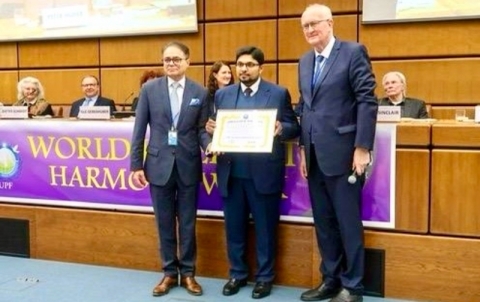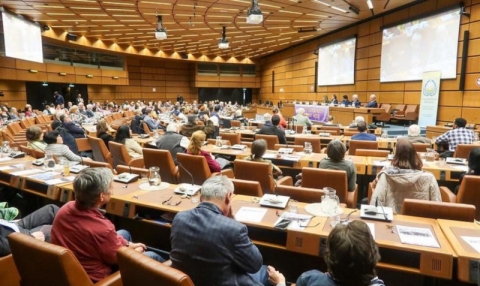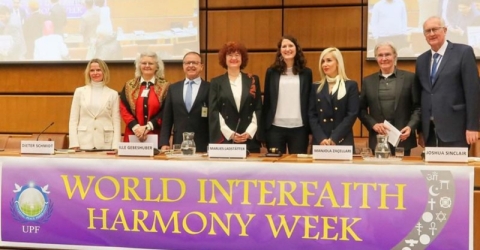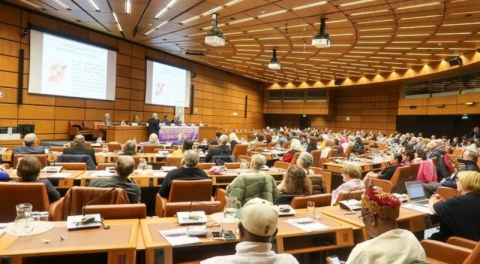News
UPF Austria celebrates World Interfaith Harmony Week at the UN
Building a Peace Narrative

A (Source: Ak)
USPA NEWS -
UPF Austria celebrates World Interfaith Harmony Week at the UN
UPF Austria launched its annual conference entitled: “Building a Peace Narrative at a time of Global Crisis: The Contribution of Religion” at the UN in Vienna celebrating the World Interfaith Harmony Week on Friday Feb, 2nd 2024 with 200 guests attending.
Mr Peter Haider, President, Universal Peace Federation, Austria first thanked the panellists, participants, sponsors, and contributors. He highlighted the background of the World Interfaith Harmony Week, first proposed by King Abdullah II of Jordan in September 2010, and unanimously adopted by the UN General Assembly the following month.
Referring to the need for enlightened people of different faiths who can draw on aspects of their traditions to contribute to society’s wellbeing, he said that UPF and its Peace Ambassadors have celebrated the week annually since 2013 to encourage understanding, respect, and cooperation for the well-being of society and world peace.
UPF Austria launched its annual conference entitled: “Building a Peace Narrative at a time of Global Crisis: The Contribution of Religion” at the UN in Vienna celebrating the World Interfaith Harmony Week on Friday Feb, 2nd 2024 with 200 guests attending.
Mr Peter Haider, President, Universal Peace Federation, Austria first thanked the panellists, participants, sponsors, and contributors. He highlighted the background of the World Interfaith Harmony Week, first proposed by King Abdullah II of Jordan in September 2010, and unanimously adopted by the UN General Assembly the following month.
Referring to the need for enlightened people of different faiths who can draw on aspects of their traditions to contribute to society’s wellbeing, he said that UPF and its Peace Ambassadors have celebrated the week annually since 2013 to encourage understanding, respect, and cooperation for the well-being of society and world peace.
Considering the current global crises caused by wars and climate change, Mr Haider reiterated the urgent need for religions to build a peace narrative to overcome mistrust and promote dialogue, cooperation, prosperity, and peace. In conclusion, he posed the question to the panel: How can religions contribute to the peace narrative?
Dr Asfar Rathor, former UN diplomat, moderator of the first session, welcomed all contributors and participants and referred to the theme of building a peace narrative in a global crisis and the role of religion and the UN SDGs in achieving peace. Religions can support sustainable development and overcome poverty and environmental degradation by promoting compassion, generosity, care, and protection for the environment. Such values advance social and economic well-being by raising awareness and helping to create a sustainable world. Dr Rathor mentioned the Ebola crisis in West Africa in 2014-2015, where Christian and Muslim religious leaders successfully transformed the message of fear from the government and health agencies into a message of hope and compassion.
Dr Asfar Rathor, former UN diplomat, moderator of the first session, welcomed all contributors and participants and referred to the theme of building a peace narrative in a global crisis and the role of religion and the UN SDGs in achieving peace. Religions can support sustainable development and overcome poverty and environmental degradation by promoting compassion, generosity, care, and protection for the environment. Such values advance social and economic well-being by raising awareness and helping to create a sustainable world. Dr Rathor mentioned the Ebola crisis in West Africa in 2014-2015, where Christian and Muslim religious leaders successfully transformed the message of fear from the government and health agencies into a message of hope and compassion.
Dr Rathor concludes that UN agencies, realising that most people have a religious affiliation, now work in closer partnership with local community faith leaders to help resolve conflicts.
Jean-Luc Lemahieu, UNODOC Director, Policy Analysis and Public Affairs, emphasised the need to search for common ground in times of turmoil. Referring to the pessimistic narratives of war, conflict, climate change, and the refugee crisis, he said the world should hear optimistic narratives as 25% of the global population is children under 18. However, Africa, with a median age of 18 years, has the lowest life expectancy. Hence, the youth, who hear pessimistic narratives, escape through migration, crime, radicalisation, or drugs. He believes that religion can fill the void for an optimistic narrative of peace and tolerance. The UN annual World Interfaith Harmony Week promotes dialogue, understanding, and cooperation among people of various faiths; it fosters respect, tolerance, and peaceful coexistence. It encourages interfaith activities to promote a harmonious and inclusive society based on shared values of compassion, love, and respect.
Jean-Luc Lemahieu, UNODOC Director, Policy Analysis and Public Affairs, emphasised the need to search for common ground in times of turmoil. Referring to the pessimistic narratives of war, conflict, climate change, and the refugee crisis, he said the world should hear optimistic narratives as 25% of the global population is children under 18. However, Africa, with a median age of 18 years, has the lowest life expectancy. Hence, the youth, who hear pessimistic narratives, escape through migration, crime, radicalisation, or drugs. He believes that religion can fill the void for an optimistic narrative of peace and tolerance. The UN annual World Interfaith Harmony Week promotes dialogue, understanding, and cooperation among people of various faiths; it fosters respect, tolerance, and peaceful coexistence. It encourages interfaith activities to promote a harmonious and inclusive society based on shared values of compassion, love, and respect.
This optimistic peace narrative of religion counters extremist hate narratives, addressing the root causes of social and economic inequality by promoting justice and compassion; this encourages inclusive development and social cohesion. Mr. Lemahieu emphasised the need to cooperate with international organisations, such as UNODC, which deals with transnational crime, focusing on the youth - the principal victims. In conclusion, he highlights the need to embrace the universally shared values promoted by all religions to foster dialogue and peace
HE Ms Rana Abida, Chargé d’Affaires of the Hashimite Kingdom of Jordan to Austria, began with the Muslim peace greeting and emphasised the need for religion and coordinated multilateral action to address multiple global crises and cited HM King Abdulla that ‘no country can face these crises and provide for its future in isolation.’ Highlighting the central role of the UN, she said the key lies in using its tools with respect and humility and learning from each other. Amid turbulence in the world, she said Islam calls for harmony, coexistence, and peace. However, many outlaws exploit the true teaching of Islam and engage in terrorism. Basic human rights should be enjoyed by all, including Palestinians.
Ms Abida stressed the need for interreligious harmony to overcome mistrust between people of different faiths. This goes together with securing peace and overcoming poverty and injustice since humanity is bound together by mutual interests and shared commandments to love God and neighbour. Concluding, she called on the global community to come together to create world peace.
more information: https://Aurangzeb
Liability for this article lies with the author, who also holds the copyright. Editorial content from USPA may be quoted on other websites as long as the quote comprises no more than 5% of the entire text, is marked as such and the source is named (via hyperlink).










